Are you an adventurous person looking for your next exciting solo trip? Look no further than Backpacking in North Carolina, the Tar Heel State! North Carolina offers breathtaking natural beauty, diverse landscapes, and endless opportunities for backpacking adventures.
Contents
As a professional copywriting journalist, I have had the pleasure of exploring North Carolina’s many backpacking trails and state parks.
And now, I’m excited to share my tips and advice for planning your very own backpacking adventure in North Carolina.
Key Takeaways
- North Carolina offers a variety of backpacking trails and state parks for solo adventurers.
- The Tar Heel State boasts stunning natural beauty and diverse landscapes to explore.
- Proper planning, packing, and safety considerations are essential for a successful backpacking trip in North Carolina.
- The iconic Appalachian Trail runs through North Carolina and offers a unique backpacking experience.
- Backpacking in North Carolina provides a sense of adventure and unforgettable experiences in the great outdoors.
Exploring the Natural Beauty of North Carolina
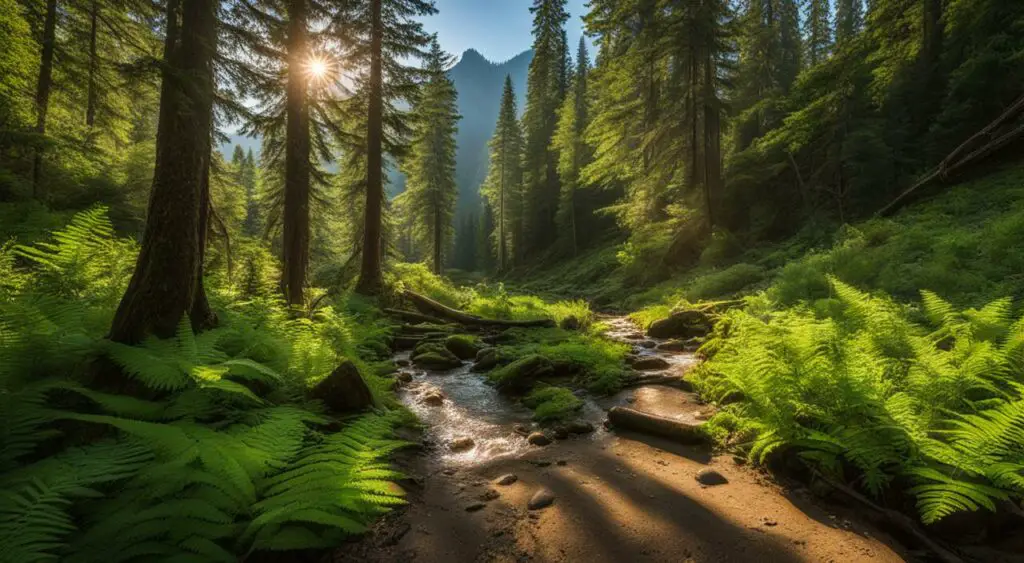
North Carolina is a state that boasts some of the most breathtaking natural beauty in America. With its diverse landscape.
Including the majestic Blue Ridge Mountains, pristine beaches, and lush forests, it’s no wonder that North Carolina is a popular destination for backpackers.
Western North Carolina, in particular, is a backpacker’s paradise.
With its rugged terrain, verdant forests, and cascading waterfalls, it offers an unforgettable experience for those seeking adventure in the great outdoors.
There are countless backpacking trails across the state, ranging from easy day hikes to challenging multi-day treks.
No matter your skill level or preference, there’s a trail that will suit you.
Backpacking Trails in North Carolina
North Carolina is home to a vast network of backpacking trails, offering hikers a chance to explore the state’s natural wonders on foot.
Some of the best backpacking trails in the state include:
- The Appalachian Trail
- The Mountains-to-Sea Trail
- The Art Loeb Trail
- The Foothills Trail
- The Shining Rock Wilderness Loop
These trails offer backpackers a chance to explore some of the state’s most beautiful landscapes, including its lush forests, towering peaks, and crystal-clear mountain streams.
Whether you’re hiking through the rolling hills of the Piedmont or the rugged terrain of the Appalachian Mountains, North Carolina’s backpacking trails offer an experience like no other.
Carolina’s Natural Beauty
North Carolina’s natural beauty is not limited to its mountains and trails. The state is also home to some of the most picturesque beaches on the East Coast.
From the idyllic Outer Banks to the charming town of Wilmington, North Carolina’s beaches offer backpackers a chance to relax and unwind after a long day on the trails.
And let’s not forget about the state’s incredible forests, which are home to a wide array of flora and fauna.
The Pisgah and Nantahala National Forests offer backpackers a chance to explore more than a million acres of pristine wilderness.
Hiking the Appalachian Trail in North Carolina
As an avid backpacker, I can attest that the Appalachian Trail in North Carolina is a must-do for any hiking enthusiast.
Stretching over 88 miles along the state’s western border, the trail offers breathtaking views and challenging terrain for a rewarding backpacking experience.
One of the best sections of the trail is located in Great Smoky Mountains National Park. Here, you’ll encounter stunning panoramic views of the mountains and valleys below.
It’s important to note that the terrain can be steep and rugged, so be sure to come prepared with proper hiking and camping gear.
Another popular section of the Appalachian Trail in North Carolina is found in the Pisgah National Forest.
This portion of the trail offers a diverse range of terrain, from rocky cliffs to lush forests.
The trail also passes by famous landmarks such as the iconic Max Patch, a bald mountain with panoramic views in all directions.
For those seeking a true multi-day backpacking adventure, consider hiking the entire stretch of the Appalachian Trail in North Carolina.
This challenging trek typically takes around 7-10 days and requires significant preparation and planning.
However, the sense of accomplishment and stunning scenery make it a bucket list-worthy experience.
Tips for a Successful Hike
Whether you’re hiking a small section or the entire trail, it’s important to come prepared for the journey ahead:
- Research the trail and check the weather forecast before embarking on your journey.
- Make sure you have appropriate gear and clothing, including sturdy hiking boots, a backpack, a tent, sleeping bag, and plenty of water and food.
- Plan your route accordingly, factoring in distance, terrain, and elevation gain.
- Be aware of your physical limitations and take breaks as needed.
- Leave no trace behind and follow all national park and forest regulations.
“The Appalachian Trail in North Carolina offers breathtaking views and challenging terrain for a rewarding backpacking experience.”
Overall, the Appalachian Trail in North Carolina is a true gem for backpackers seeking an unforgettable adventure. So, grab your gear and hit the trail for an experience of a lifetime.
Discovering State and National Parks in North Carolina
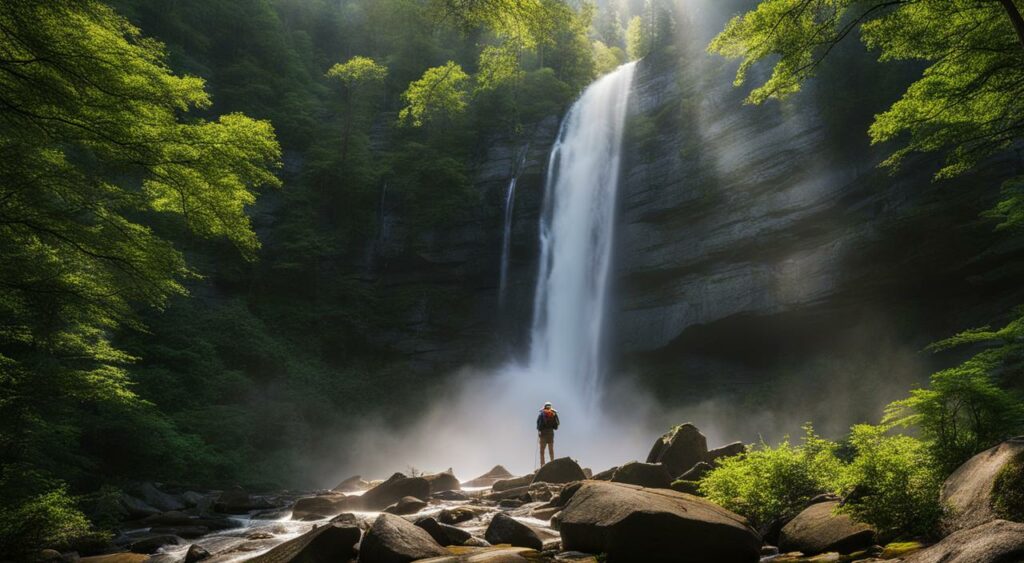
If you’re looking for stunning backpacking trails in North Carolina, state and national parks are a great place to start.
The state boasts an impressive range of natural landscapes, from forested mountains to sandy beaches, and there are plenty of parks to explore.
Great Smoky Mountains National Park
One of the most popular national parks in the country, Great Smoky Mountains National Park is a must-visit for backpackers.
Spanning the borders of North Carolina and Tennessee, the park features over 800 miles of trails through old-growth forests, rocky ridges, and cascading waterfalls.
Be sure to check out the Appalachian Trail, which runs through the park for 71 miles.
Pisgah National Forest
Located in Western North Carolina, Pisgah National Forest offers over 500,000 acres of pristine wilderness to explore.
The forest is home to several popular backpacking trails, including the Art Loeb Trail and the Mountains-to-Sea Trail.
Be sure to stop by Looking Glass Falls, a stunning 60-foot waterfall, during your visit.
State Parks
North Carolina is also home to a number of state parks that offer excellent backpacking opportunities. Some of our favorites include:
| Park | Location | Features |
|---|---|---|
| Hanging Rock State Park | Stokes County | Waterfalls, rock formations, scenic views |
| Eno River State Park | Durham and Orange Counties | Forest, river, hiking trails, fishing |
| South Mountains State Park | Burke County | Mountains, waterfalls, camping, equestrian trails |
No matter which state or national park you choose to visit, you’re sure to be amazed by the natural beauty of North Carolina.
Must-Visit Trails in North Carolina
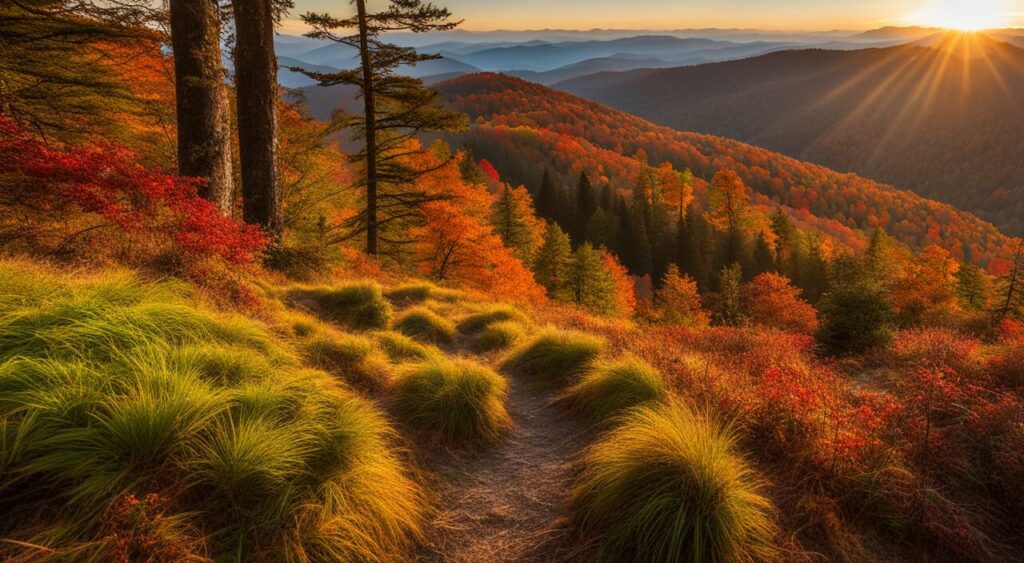
North Carolina is home to some of the most beautiful and scenic trails that are perfect for backpacking.
Whether you are a beginner or an experienced hiker, there is a trail that will suit your skill level. Here are some must-visit trails in North Carolina:
1. Grassy Ridge
Grassy Ridge is an amazing backpacking destination that offers breathtaking views of the surrounding mountains. The trail is located in the Roan Highlands and is a part of the Appalachian Trail.
The trail is known for its wildflowers and stunning views of the mountains. It’s a challenging hike, but the reward is worth the effort.
2. Blue Ridge Parkway
The Blue Ridge Parkway is a must-visit destination for any backpacking enthusiast. The Parkway runs for 469 miles and offers stunning views of the Appalachian Mountains.
There are many trails that can be accessed from the Parkway, ranging from easy to challenging. The trails offer an opportunity to experience the beauty of the mountains up close.
3. Mountains-to-Sea Trail
The Mountains-to-Sea Trail is a 1175-mile trail that runs from the Great Smoky Mountains to the Outer Banks.
The trail passes through many different ecosystems, including forests, mountains, and coastal areas. There are many access points along the trail, making it easy to plan a backpacking trip along the trail.
4. Art Loeb Trail
The Art Loeb Trail is a backpacker’s paradise that offers stunning views of the surrounding mountains.
The trail is located in the Pisgah National Forest and is known for its challenging terrain. The trail is 30 miles long and is a loop trail, making it easy to plan a multi-day backpacking trip.
These are just a few of the many backpacking trails that North Carolina has to offer. Each trail offers a unique experience and is a great way to explore the natural beauty of the state. Happy hiking!
The Art Loeb Trail: A Backpacker’s Paradise
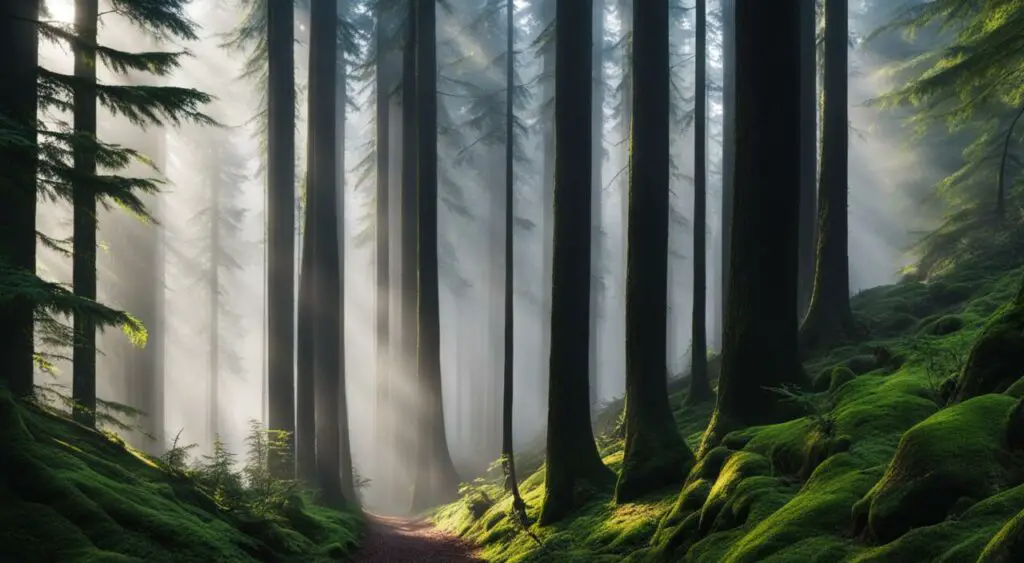
If you’re looking for a backpacking trail surrounded by stunning scenery and breathtaking views, the Art Loeb Trail in North Carolina is a fantastic choice.
This 30-mile trail is located in Western North Carolina and offers a challenging yet rewarding backpacking experience.
As an experienced backpacker, I have hiked the Art Loeb Trail several times and can attest to its beauty and difficulty.
The trail starts at the Davidson River Campground and ends at the Daniel Boone Boy Scout Camp.
Along the way, hikers will encounter steep climbs, rocky terrain, and stunning vistas of the Blue Ridge Mountains.
One of the highlights of the Art Loeb Trail is the incredible 360-degree view from the summit of Black Balsam Knob, which is the highest point on the trail.
The panoramic view of the surrounding mountains and valleys is truly awe-inspiring and makes the challenging hike to the summit well worth it.
Backpacking trails near Asheville are abundant, but the Art Loeb Trail stands out for its rugged beauty and unparalleled vistas. As you make your way along the trail, you’ll discover that the views only get better and better.
If you’re planning to backpack the Art Loeb Trail, it’s essential to come prepared. The trail is challenging, and novice backpackers may find it difficult.
Be sure to bring plenty of water, food, and proper gear, including a sturdy backpack and hiking boots.
“The Art Loeb Trail is a challenging yet rewarding backpacking experience.”
Overall, the Art Loeb Trail is a must-visit for backpackers seeking an unforgettable experience in North Carolina. The trail’s rugged beauty and stunning vistas make it a backpacker’s paradise.
Exploring the Western State Parks
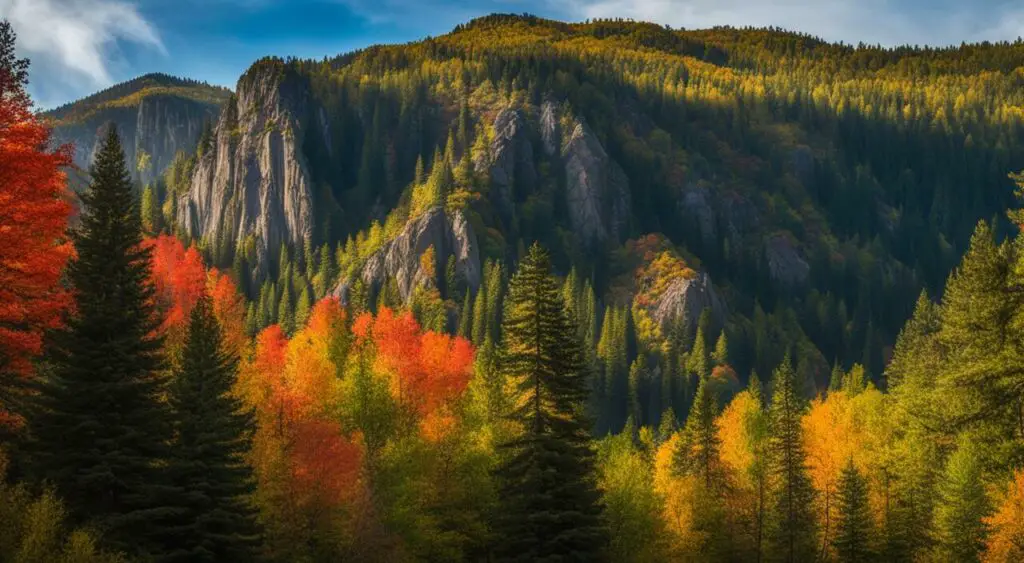
If you’re looking for a unique and unforgettable backpacking experience in North Carolina, exploring the Western state parks should be at the top of your list.
From the majestic Blue Ridge Mountains to the breathtaking Pisgah National Forest, Western North Carolina is a nature lover’s paradise.
The state parks in this region offer a diverse range of outdoor activities, including hiking, fishing, and camping.
Here are some of the must-visit state parks in Western North Carolina that offer excellent backpacking opportunities:
| State Park | Location | Unique Features |
|---|---|---|
| Mount Mitchell State Park | Burnsville, NC | Home to the highest peak east of the Mississippi River. |
| Chimney Rock State Park | Chimney Rock, NC | Offers stunning views of the Hickory Nut Gorge and Lake Lure. |
| Gorges State Park | Sapphire, NC | Features gorgeous waterfalls, rugged terrain, and abundant wildlife. |
| Grandfather Mountain State Park | Linville, NC | Offers challenging hikes and stunning views of the surrounding mountains. |
Whether you’re an experienced backpacker or a novice hiker, the Western state parks in North Carolina offer something for everyone.
With their unique features and breathtaking landscapes, they are sure to provide an unforgettable backpacking experience.
Overnight Hiking and Camping in North Carolina
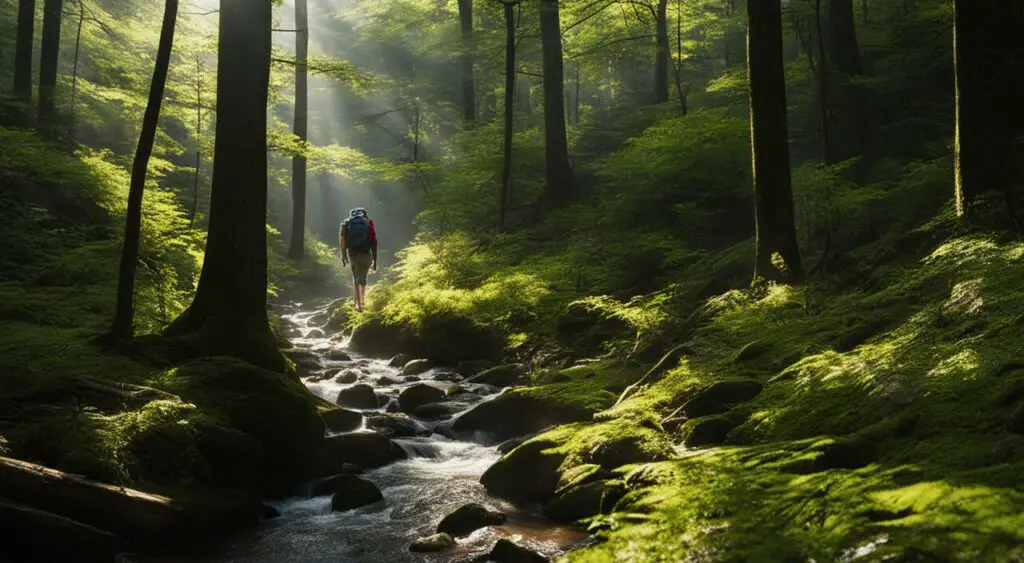
Exploring the great outdoors in North Carolina doesn’t have to end when the sun goes down. With overnight hiking and camping, you can extend your adventure and experience the beauty of the state under the stars.
Here are some tips for a memorable overnight backpacking adventure in North Carolina.
Backpacking Adventures
North Carolina offers numerous backpacking adventures, from the iconic Appalachian Trail to lesser-known trails through scenic state parks.
When planning your overnight backpacking adventure, consider your skill level and the level of difficulty of the trail.
Make sure to pack all the essentials, including a high-quality, lightweight backpack, a reliable tent, and a sleeping bag suitable for the season.
Don’t forget to bring a headlamp or flashlight, a first-aid kit, and plenty of water and food.
Camping
When camping overnight, it’s essential to choose a suitable campsite. Most trails and state parks in North Carolina have established campsites where you can pitch your tent.
Make sure to follow established camping rules and regulations, such as using a bear canister for food storage and leaving no trace.
Always set up your tent away from water sources and trails to avoid any potential hazards.
Hikes
When planning your hike, consider the distance and elevation gain of the trail.
If you’re a beginner backpacker, start with a shorter trail and gradually work your way up to longer and more challenging hikes. Always research the trail beforehand and check the weather forecast before setting out.
Bring a map and compass or GPS device to help navigate the trail, and don’t hesitate to turn back if conditions become unsafe.
One of my favorite overnight backpacking hikes in North Carolina is the Art Loeb Trail in the Pisgah National Forest.
This 30-mile trail offers stunning views of the Blue Ridge Mountains and requires intermediate skills to hike. The trail can be broken into smaller sections or hiked in its entirety over several days.
Overnight
When camping overnight, make sure to set up your tent early and start a campfire for warmth and cooking. Always abide by fire safety rules and use a designated fire pit when available.
Keep your food stored safely in a bear canister or other food storage container to prevent attracting wildlife to your campsite.
Backpacking North Carolina
North Carolina is a backpacker’s paradise, offering endless opportunities for adventure and exploration. Whether you’re a seasoned backpacker or a beginner, the state has something to offer for every skill level.
With proper planning, preparation, and safety precautions, overnight hiking and camping in North Carolina can be an unforgettable experience.
Planning Backpacking Trips in North Carolina
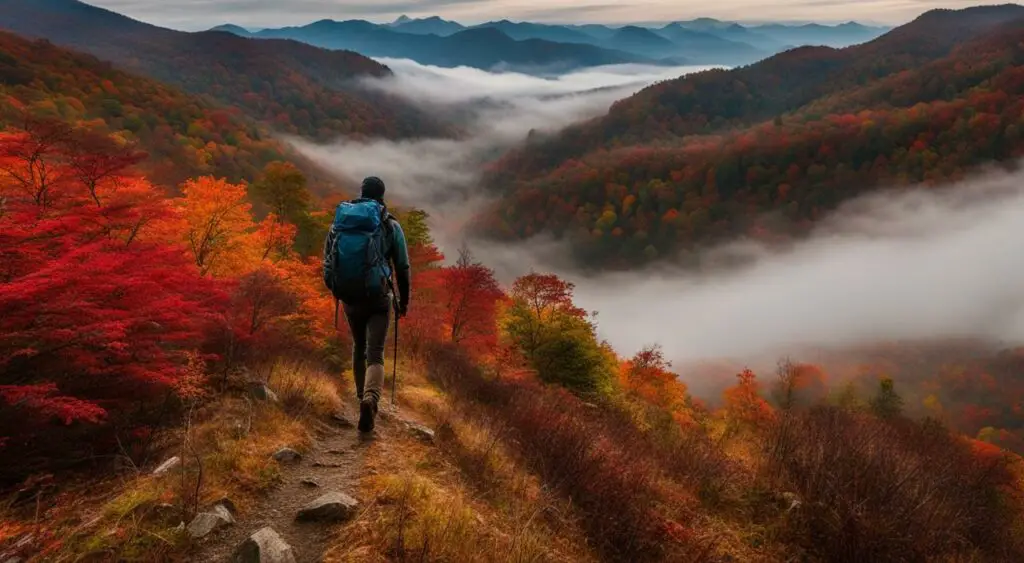
Planning a backpacking trip in North Carolina can be an exciting experience. With a variety of trails and landscapes to choose from, the possibilities are endless.
Here are some tips for planning your next backpacking adventure:
- Choose Your Trail: North Carolina offers a plethora of backpacking trails, so it’s important to choose the one that fits your interests and skill level. Some popular backpacking trails include the Appalachian Trail, the Art Loeb Trail, and the Mountains-to-Sea Trail.
- Check for Permits: Some trails require permits for overnight stays, so be sure to check the trail’s website for more information. For example, permits are required for overnight camping on the Appalachian Trail.
- Pack for Your Trip: Make sure to gather all the necessary gear for a backpacking trip, including a tent, sleeping bag, food, and water. It’s important to also bring appropriate clothing and footwear for the weather conditions and trail terrain.
- Research the Area: Before your trip, research the area and the trail you’ll be hiking. Be sure to familiarize yourself with the terrain, landmarks, and potential hazards along the way.
- Plan Your Route: Plan your route carefully, considering the distance, elevation gain, and trail difficulty. It’s important to pace yourself and know your own physical limits when backpacking.
- Consider Going with a Group: Backpacking with a group can be a fun and safe option, especially for those new to the activity. Make sure to choose a group of individuals with the same skill level and interests as you.
- Leave No Trace: Help preserve the natural beauty of North Carolina’s trails by practicing Leave No Trace principles. This includes packing out all trash and waste, using established campsites, and respecting wildlife and vegetation.
By following these tips, you can plan a successful and enjoyable backpacking trip in North Carolina. Don’t forget to pack your sense of adventure and your camera!
Safety Tips for Backpacking in North Carolina
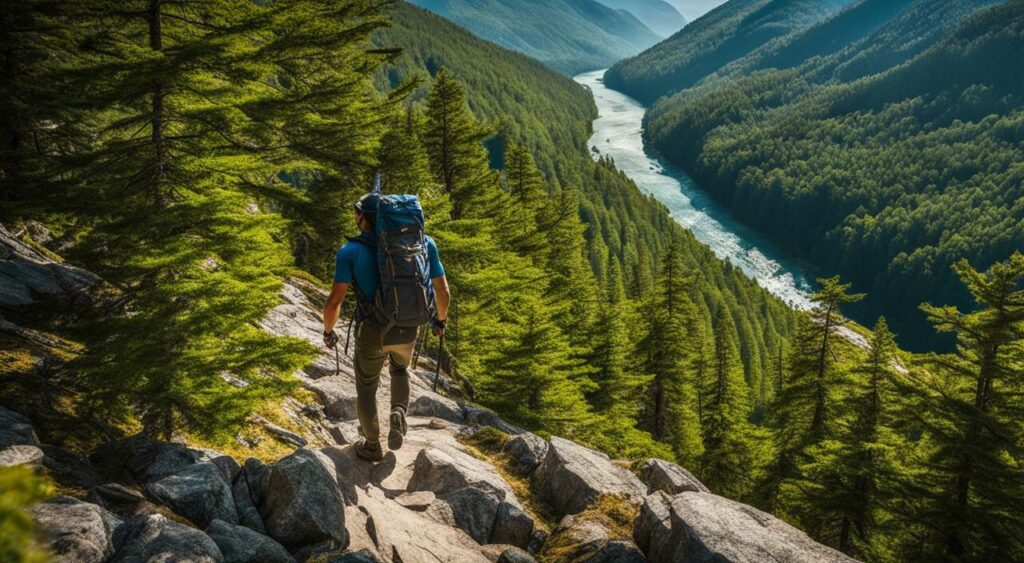
Backpacking in North Carolina offers some of the most beautiful and exciting trails in the country. While it can be a thrilling experience, it’s important to prioritize safety.
Here are some essential safety tips for backpackers exploring North Carolina’s hiking trails and national forests:
1. Plan Ahead
Before embarking on any backpacking trip, it’s critical to have a detailed plan. Research the trail you’ll be hiking and be familiar with the area’s terrain, weather, and potential hazards.
Make sure to have a map and compass, and know how to use them. Share your itinerary with someone you trust, and don’t stray from it.
2. Pack Appropriately
Having the right gear can make all the difference to your backpacking adventure.
Make sure to pack essentials such as a first aid kit, proper clothing for the weather, enough food and water, and a reliable backpack.
Always carry a headlamp, extra batteries, and a signaling device like a whistle or a mirror. Pack a high-quality tent if you plan to camp overnight and check the weather forecast before you go.
3. Stay Alert
When backpacking in North Carolina, it’s essential to stay aware of your surroundings. Watch out for wildlife, keep an eye on the trail, and be mindful of changing weather conditions.
Pay attention to your level of hydration and don’t push yourself beyond your limits. If you spot a potential hazard, such as a downed tree or a rockslide, use caution and avoid the area if possible.
4. Respect the Environment
Preserving the natural environment is a responsibility that falls on every backpacker in North Carolina. Make sure to follow Leave No Trace principles, pack out all trash, and avoid damaging plants and trees.
If you need to relieve yourself, use designated facilities or bury waste at least 200 feet away from water sources. Be mindful of fire safety and only build fires in designated areas if allowed.
5. Know Your Limits
Backpacking in North Carolina can be physically challenging, and it’s important to know your limits. Don’t push yourself beyond your physical abilities or attempt a trail that’s beyond your skill level.
Listen to your body and take breaks as needed. If you feel any discomfort or pain, stop immediately and assess the situation.
By following these safety tips, you can help ensure a safe and enjoyable backpacking experience in North Carolina’s beautiful wilderness.
Embracing the North Carolina Backpacking Experience
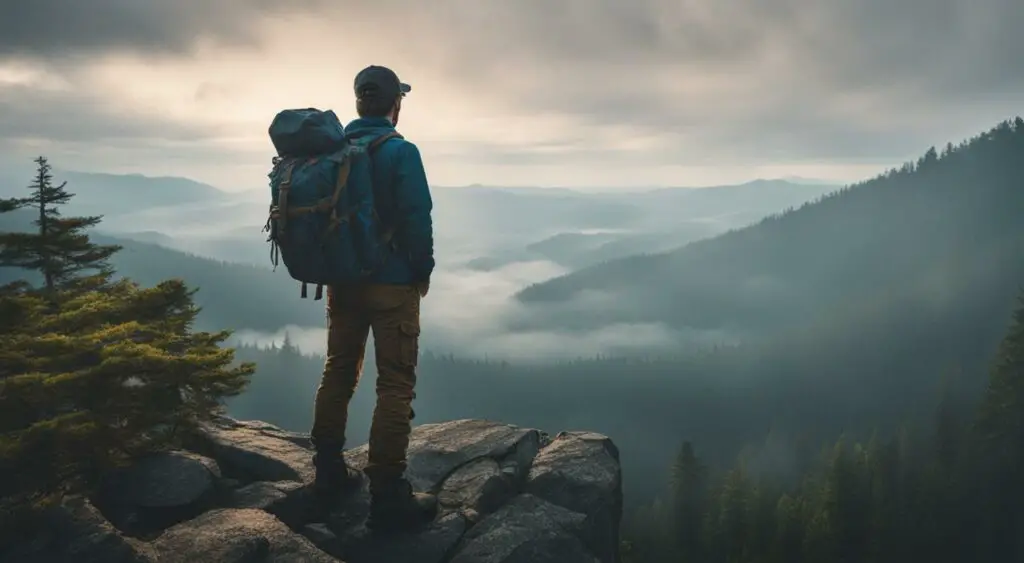
As a published writer and avid backpacker, I can confidently say that North Carolina offers some of the best hiking and backpacking trails in the country.
From the stunning landscapes of Western North Carolina to the iconic Appalachian Trail, the Tar Heel State has it all for adventurous backpackers like myself.
One of my favorite hikes in the state is the Grassy Ridge trail, which offers breathtaking panoramic views of the mountains.
It’s no wonder Backpacker Magazine published an article about this hike, highlighting its beauty and unique experiences.
But Grassy Ridge is just one of the many Carolina trails that have been featured in Backpacker Magazine over the years.
With so much natural beauty and diverse backpacking opportunities, it’s no surprise that North Carolina is a favorite among backpackers.
But don’t just take my word for it – Backpacker Magazine published an article titled “Why North Carolina is the Top State for Hiking and Backpacking.”
The article showcases the state’s diverse terrain and unique backpacking experiences, from the Great Smoky Mountains National Park to the Pisgah National Forest.
For me, backpacking in North Carolina is not just about the breathtaking scenery and thrilling hikes.
It’s also about embracing the sense of adventure and the opportunity to disconnect from the busy world and connect with nature. So, what are you waiting for? Start planning your North Carolina backpacking trip today!

Conclusion
As a seasoned backpacking journalist, I can confidently say that North Carolina offers some of the best backpacking experiences in the country.
From the stunning natural beauty of Western North Carolina to the iconic Appalachian Trail, there are plenty of opportunities for solo adventurers to explore this beautiful state.
Whether you’re an experienced backpacker or new to the activity, North Carolina has something for everyone.
With an abundance of state and national parks to choose from and must-visit trails like Grassy Ridge and the Art Loeb Trail, the backpacking possibilities are endless.
However, it’s important to prioritize safety while backpacking in North Carolina.
Always come prepared, stay aware of your surroundings, and follow the rules and regulations of the trail and park you’re visiting.
And most importantly, remember to enjoy the beautiful outdoor scenery and the sense of adventure that comes with backpacking in North Carolina.
In conclusion, I highly recommend planning a backpacking trip in North Carolina for an unforgettable solo adventure. Happy hiking!

FAQ
-
Can I go backpacking in North Carolina alone?
Absolutely! Backpacking in North Carolina is a great solo adventure. Just make sure to plan your trip well, inform someone of your itinerary, and follow basic safety precautions.
-
What are some must-visit trails in North Carolina?
There are numerous breathtaking trails in North Carolina. Some popular ones include Grassy Ridge, Blue Ridge Parkway, and the Art Loeb Trail. Each offers its own unique scenery and backpacking experience.
-
Are there any state or national parks in North Carolina for backpacking?
Yes, North Carolina is home to several state and national parks that are perfect for backpacking. The Great Smoky Mountains National Park and Pisgah National Forest are some notable destinations worth exploring.
-
Is it safe to go backpacking in North Carolina?
While backpacking in North Carolina can be a safe and enjoyable experience, it’s important to follow safety precautions. Be prepared, stay aware of your surroundings, and adhere to trail regulations to ensure a safe trip.
-
How do I plan a backpacking trip in North Carolina?
Planning a backpacking trip in North Carolina involves choosing appropriate trails, organizing logistics such as permits and transportation, and packing essential gear. Researching favorite backpacking trails and seeking advice from experienced backpackers can also be helpful.
-
What are some tips for overnight hiking and camping in North Carolina?
When overnight hiking and camping in North Carolina, remember to pack essentials like a reliable tent, sleeping bag, and food. Be mindful of safety considerations, follow Leave No Trace principles, and check weather conditions before heading out.
-
Can you provide some safety tips for backpacking in North Carolina?
Absolutely! Some important safety tips for backpacking in North Carolina include carrying a map and compass, informing someone of your itinerary, staying hydrated, and being aware of wildlife. It’s also crucial to stay on designated trails and follow any trail advisories or closures.
-
Is backpacking in North Carolina suitable for beginners?
Yes, North Carolina offers a range of trails suitable for beginners. However, it’s essential for beginners to do their research, start with shorter hikes, and gradually build up their abilities and confidence before attempting more challenging backpacking trips.

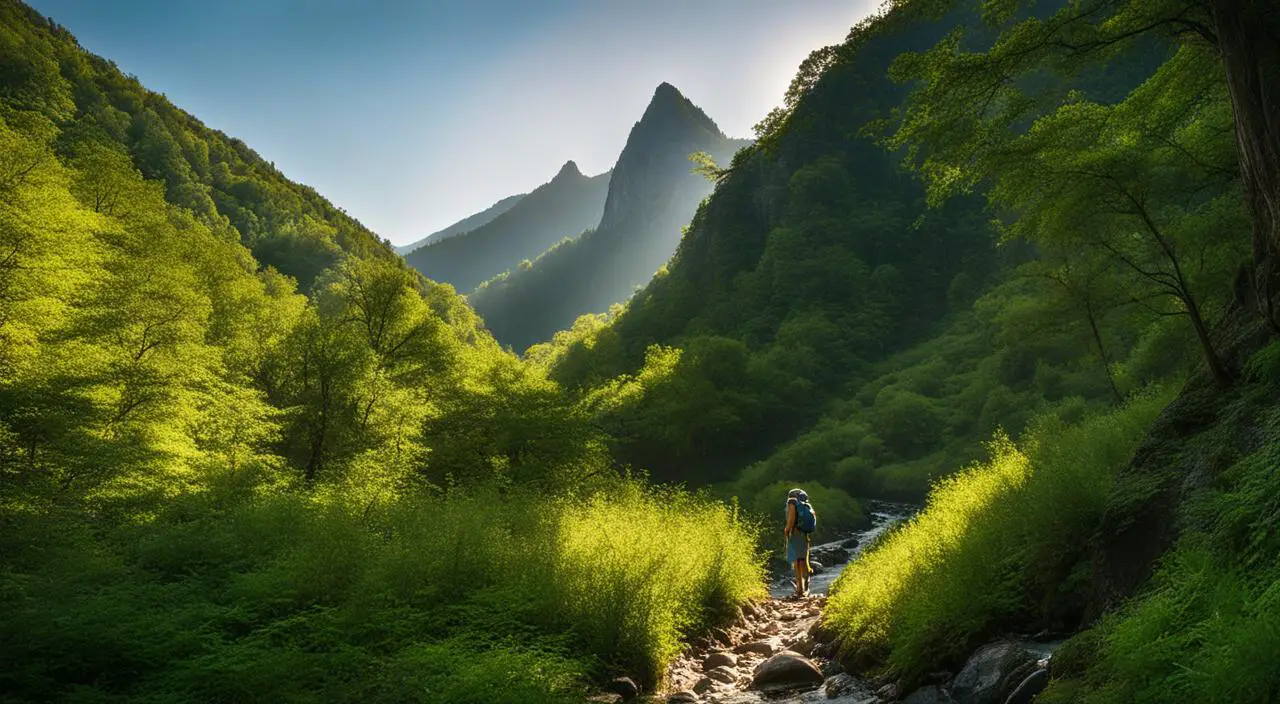


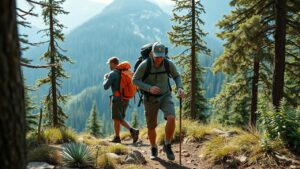


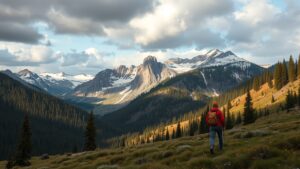

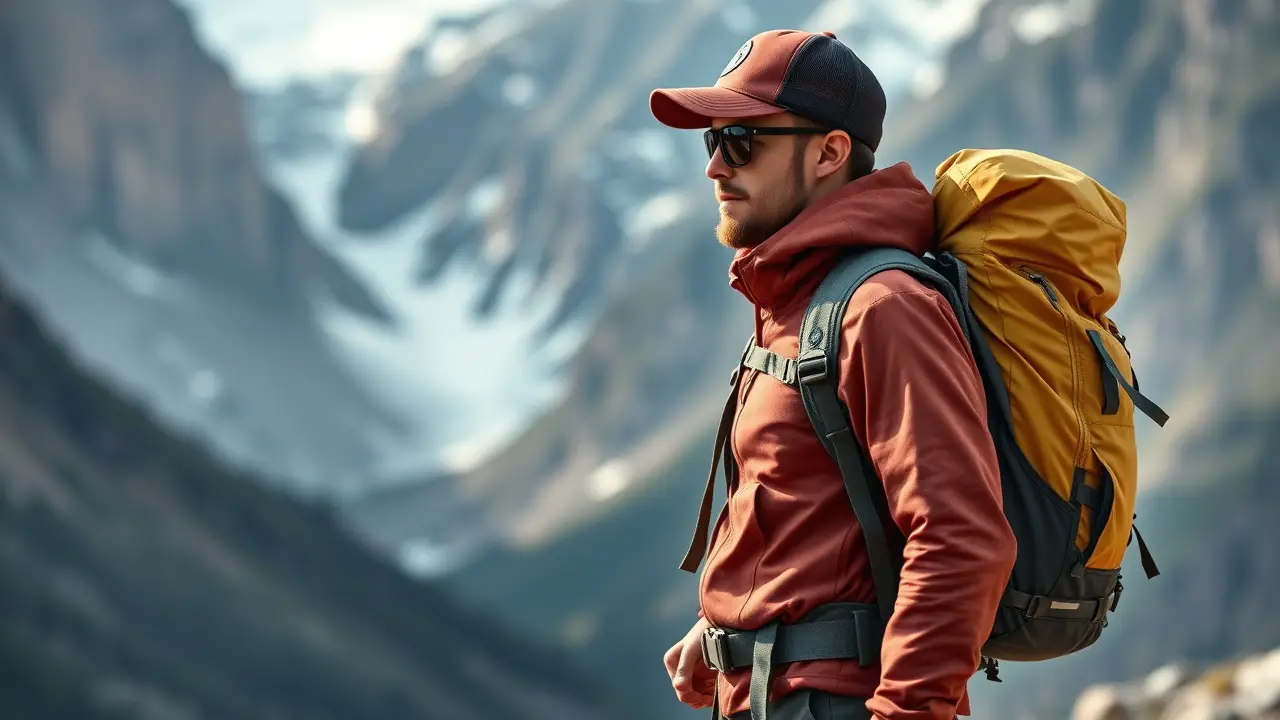
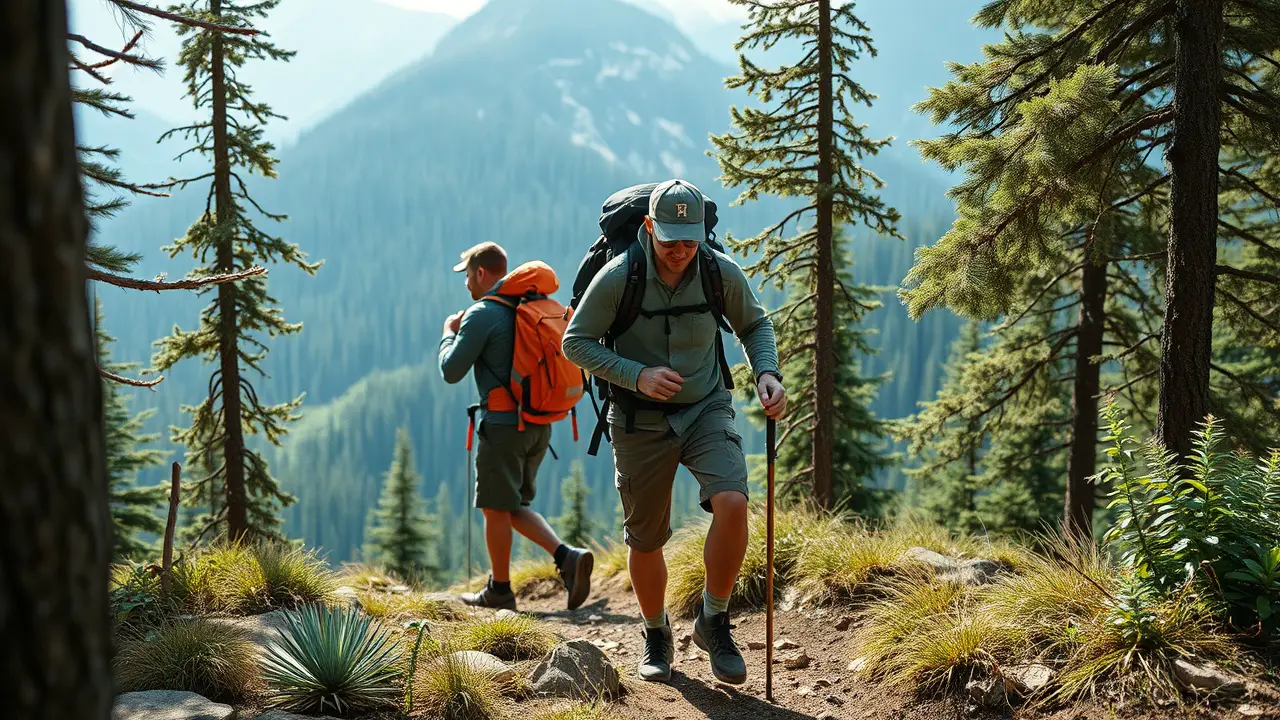
Leave a Reply